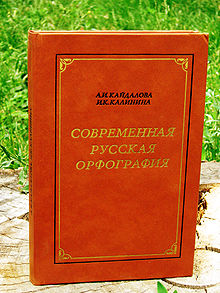This article includes a list of general references, but it lacks sufficient corresponding inline citations. (February 2023) |

Russian orthography (Russian: правописа́ние, romanized: pravopisaniye, IPA: [prəvəpʲɪˈsanʲɪjə]) is an orthographic tradition formally considered to encompass spelling (Russian: орфогра́фия, romanized: orfografiya, IPA: [ɐrfɐˈɡrafʲɪjə]) and punctuation (Russian: пунктуа́ция, romanized: punktuatsiya, IPA: [pʊnktʊˈat͡sɨjə]). Russian spelling, which is mostly phonemic in practice, is a mix of morphological and phonetic principles, with a few etymological or historic forms, and occasional grammatical differentiation. The punctuation, originally based on Byzantine Greek, was in the seventeenth and eighteenth centuries reformulated on the models of French and German orthography.
The IPA transcription attempts to reflect vowel reduction when not under stress. The sounds that are presented are those of the standard language; other dialects may have noticeably different pronunciations for the vowels.
© MMXXIII Rich X Search. We shall prevail. All rights reserved. Rich X Search
